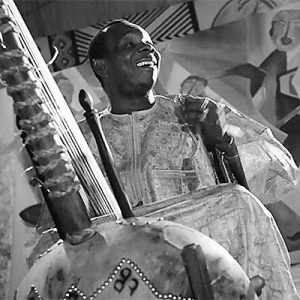24.07.2024 – News: Nachrufe – The New York Times – Giovanni Russonello — – Details
Toumani Diabaté
Er glaubte, dass Musik die durch den Kolonialismus geschaffenen Nationalgrenzen überwinden und alte Bindungen wiederherstellen könne, selbst wenn sie die Veränderungen einer globalisierten Gesellschaft aufgreife. «Toumani Diabaté tritt 2006 in Bamako, Mali auf. Sein erklärtes Ziel war es, das Erbe der Mandé sprechenden Völker in ganz Westafrika zu würdigen und diese Geschichte mit der Welt zu teilen. «Toumani Diabaté, a virtuoso of the kora, a 21-stringed West African instrument, which he often put into dialogue with other musical traditions from around the globe, died on Friday in Bamako, Mali. He was 58. «His death, in a hospital, was caused by kidney failure, said his manager, Saul Presa. «Born in Mali to a line of griots, or traditional West African musician-historians, that he traced back more than 70 generations, Mr. Diabaté was devoted to celebrating the heritage of Mandé-speaking peoples throughout West Africa, and to sharing that history with the world. ««If you think of West Africa as a body, then the griot is the blood,» he told The New York Times in 2006. «We are the guardians of West Africa›s society. We are communicators.» «He believed that music could transcend national borders set by colonialism and restore ancient ties, even as it embraced the changes of a globalizing society. That mission inspired him to create his flagship ensemble, the Symmetric Orchestra. ««I started building this band to rebuild Manden empire in a cultural way,» he said in a 2011 interview with Uncut magazine, referring to the Mali Empire that once covered the Upper Niger River basin from present-day Mali to Senegal. «The musicians are all from West African, Manden countries. I took the best from Senegal, Ghana, Guinea, Burkina Faso, Mauretania, and I put them all together.» «
SK-try-2024news
